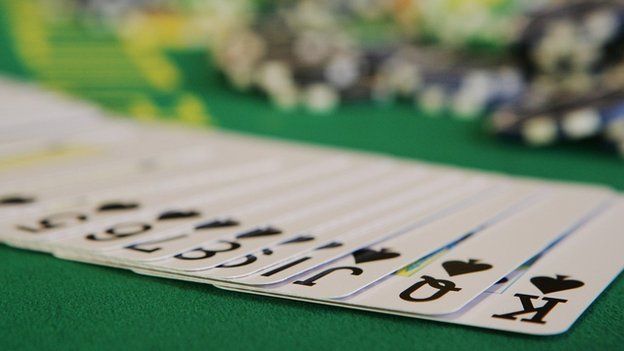Computer program 'perfect at poker'
-
Published

Scientists have created a computer program they say is the perfect poker player and never makes a mistake.
And the algorithm had a strategy so close to optimal "it can't be beaten with statistical significance within a lifetime of human poker playing".
The poker-ace algorithm is also now available online for people to test, query and even play against.
'Perfect information'
Since scientists first started to develop game-playing artificial intelligence, there have been a series of famous cases where computer algorithms developed strategies better than the very best human players.
In 1997, for example, IBM supercomputer Deep Blue defeated world chess champion Garry Kasparov.
But these machine victories have been in what are termed "perfect-information games" - where all players are informed about everything that has occurred in the game before making a decision.
This is not the case in poker, where players do not know which cards have been dealt to other players.
This new poker-playing program has taught itself to overcome this. It has played trillions of hands of poker and been designed to learn by "regretting" and remembering every decision that does not lead to the optimum outcome.
Fixed-limit heads-up Texas hold 'em
- The two players are each dealt two cards only they can see
- On the basis of these alone, the first player can choose to bet a set amount against the other or "fold" awarding the game to their opponent
- The second player can then choose to match the bet, double it or fold
- If the bet is doubled, the first player then has the option to match it or fold
- Three further cards are laid face up on the table by the dealer
- The two players bet against each other for a second time based on poker hands they could potentially complete by combining their two concealed cards with the three on the table
- Another card is laid face up on the table by the dealer
- The two players bet against each other for a third time - but now the set amount is doubled
- A fifth and final card is laid face up on the table by the dealer
- The two players bet against each other for a fourth and final time - with the set amount remaining the same as in the previous round
"Our model has spent two months playing poker again and again," said lead researcher Michael Bowling from the University of Alberta.
"It's playing 24 trillion hands of poker every second for two months.
"That's more poker hands than all of humanity - so in some sense it's not surprising that it has developed the perfect strategy."
While this might seem a playful project, the use of game theory on which the research is based could have serious implications, including for security.
Automated systems for airport checkpoints, for example, could be designed to incorporate this type of uncertainty and missing information.
In this instance, though, when Dr Bowling was asked whether he thinks purist, professional poker players might be irritated by the breakthrough, he said: "I have no idea. We'll have to see how much hate email I'll be getting come Thursday afternoon."
-
-
Published2 May 2014
-
-
-
Published21 April 2014
-